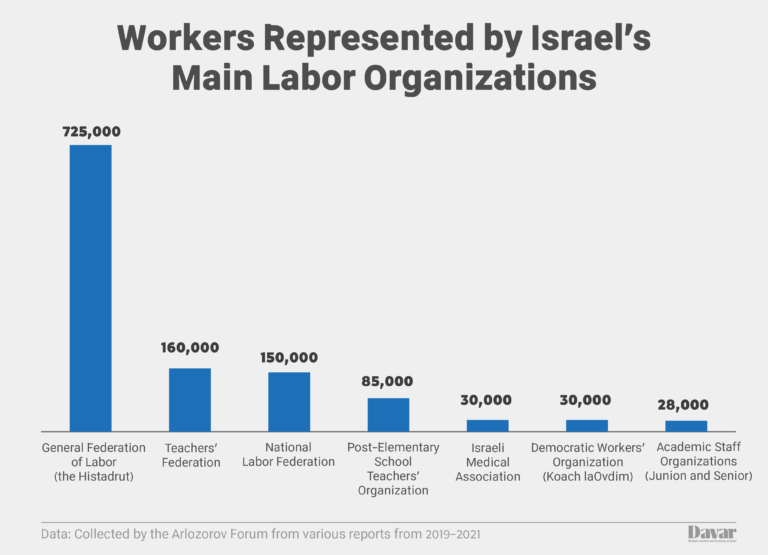
Unionized Israeli workers earn an average of 13% more than non-unionized workers, according to new research published this week by the Arlozorov Forum. According to data presented in the research, 1.3 million Israeli workers, constituting roughly 30% of the workforce, are covered by collective labor agreements. Approximately 870 thousand workers, or 21% of the workforce, are members of labor unions.
The research, which was conducted by doctoral student Matan Kolerman based on data from the European Social Survey, looked into the average salary bump, or premium, enjoyed by unionized workers in Israel and how it compares with benefits enjoyed by unionized workers in 26 other countries. Kolerman found that the salary increase for Israeli union members was the second-highest of the countries studied, with only Irish union members seeing a larger increase compared to their non-unionized colleauges. In almost every country that was studied, union members were found to receive salaries that were on average 5%-14% higher than non-union members.
“The salary premium is a result of negotiations between the employeers and the workers,” Kolerman explained in his research, adding that higher premiums and numbers of unionized workers also led to workers receiving a larger share of national income. According to Kolerman, collective bargaining on behalf of unionized workers “is actually the main tool that labor organizations can use to reduce inequality in society.”
Kolerman further noted that studies on the subject demonstrate a correlation between high rates of union membership and lower inequality. However, Kolerman pointed out that among the countries studied, Israel has more severe inequality than countries with similar unionization rates.
According to data presented in the study, the Histadrut is Israel’s largest labor organization, representing over 725 thousand workers, of whom 550 thousand are Histadrut members. The next largest labor organization is the Teachers’ Federation with 160 thousand members, followed by the National Labor Federation which represents 150 thousand workers (but has no published membership data). Other significant labor organizations include the Post-Elementary School Teachers’ Organization, with 85 thousand members, the Israeli Medical Association, with 30 thousand members, and the Democratic Workers’ Organization (Koach laOvdim), which represents 30 thousand workers, of whom 17 thousand are members.

The research also looked into labor organizations’ influence on employment, specifically focusing on their impact on the ability of the job market to respond to extreme fluctuations. The study found the Israeli economy to be highly flexible, characterized by quick recoveries from financial crises and returns to low unemployment rates.
According to Kolerman, it is likely that one factor contributing to the Israeli economy’s high flexibility is the ability of labor organizations to take responsibility for the economy at large during periods of crisis. The Histadrut, for example, signed many centralized labor agreements with the government and employers in response to the economic crisis that accompanied the outbreak of the coronavirus, as it had during the recession of the early 2000s and the 2008 financial crisis.
Amit Ben-Tzur, CEO of the Arlozorov Forum, stated that “this research shows that labor organizations improve workers’ salaries and therefore reduce inequality. In Israel, even more than in other parts of the world, unionized workers enjoy a much higher salary than non-unionized workers. There are many more benefits to labor unions, and they even take responsibility to help the economy recover from crises.”
This article was translated from Hebrew by Sam Edelman






